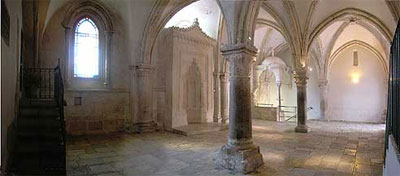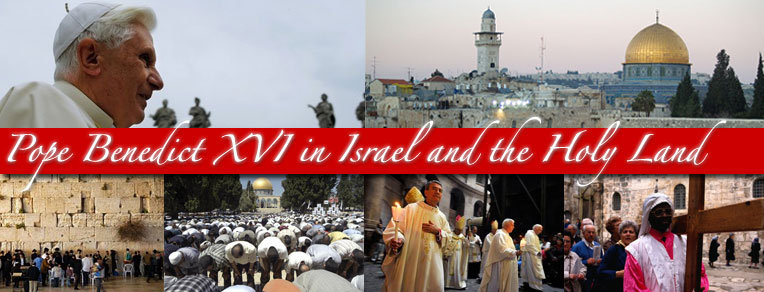“There is a lot of misinformation and I’d like to explain the principles,” Yigal Palmor, spokesman for the Foreign Ministry, told The Jewish Week at the City Hall press center set up for the pope’s visit. According to Palmor, there are three issues in play.Investigating the topic, AsiaNews.it interviews Fr David-Maria A. Jaeger, a legal expert with the Franciscan order and authority on State-Church relations in the Holy Land:“The first relates to a tax exemption for church institutions, such as churches, monasteries, schools, abbeys. The second, which is unrelated to the first, relates to immunity from expropriation. In other words, the church wants a guarantee that its property cannot be taken to build a road, for example.”
The third issue relates to the Room of the Last Supper, which Catholics call the Cenacle. “The Catholic Church has requested private ownership of the church,” a potentially inflammatory move considering that Muslims consider the site holy and many Jews believe King David is buried in a tomb beneath the Cenacle.
Unlike the first two matters, “the Cenacle is not under negotiation,” Palmor emphasized. “The Israeli government has not accepted the church’s request and it remains the property of the Israeli government.”
Whether or how much to tax property owned by the Catholic Church is the thornier of the two outstanding matters because it means a loss of tax revenues (millions of shekels) and second, because it could set a precedent for other denominations and religions, according to an official who requested anonymity. [More]
The Holy Father's pilgrimage to the Cenacle on Mount Zion, the Shrine of the Last Supper, inevitably is also a reminder of the anomaly of the present situation of this Holy Place of the Institution of the Mass and the Coming down of the Holy Spirit, which could therefore be called the Birth-place of the Church.It became the property of the Franciscan Custody of the Holy Land—indeed its mother-house—in the fourteenth century, a gift of the King and Queen of Naples, with the special blessing and approval of the Pope. Two centuries later though, the Ottoman rulers of Jerusalem at that time expelled the Franciscans by force, and now it is in the hands of the government of Israel.

The Franciscan Custody, however, has never relinquished its right of property in the Holy Place, and has all these centuries demanded its restitution, as it still does. It has done so in the name of the whole world-wide Catholic Church, which—by Papal mandate—the Franciscan Custody of the Holy Land represents at this and other Holy Places. As an enduring sign of never acquiescing in the unjust results of the violent expulsion, the principal and original title of the Custos of the Holy Land remains forever that of ‘Guardian of the Holy Mount Zion’, as is evidenced by his seal. [MoreFr. Jaegar was also interviewed for the Jewish Week article cited above.
It's a complex dispute and honestly, I can comprehend and sympathize with both parties. For example, one implication that warrants further consideration is how transfer of ownership of the Cenacle and tax-exempt status -- such as we have in the United States -- to properties held by the Catholic Church in Israel will affect ecumenical relations with other churches and relations with Muslims and other religions.
On a related note: "Status Quo" Governs Holy Land Churches (Vatican Radio):
During his pilgrimage to the Holy Land, the Pope will visit several Holy Sites which are used by the Catholic, Orthodox, and other Christian Churches.The complex relationship which exists in these Churches has not always been friendly, and in the 19th century the Ottoman Empire established what is known as the Status Quo – which has governed these Holy Sites under the rule of successive regimes.
To find out more, and to find out how this Status Quo affects the Pope’s visit, Vatican Radio spoke to Franciscan Father Athanasius Macora
Related
- Mount Zion. The Cenacle and St. Peter in Gallicantu - November 24, 2003 Studium Biblicum Franciscum. Faculty of Biblical Sciences & Archeology.











No comments:
Post a Comment